#ancient troy
Note
Achilles and Apollo analysis
ty for this ask and i’m sorry it took this long lmao… this also applies to everyone else who submitted an essay suggestion way back then, i’m still gonna be answering those eventually. i’m sorry for the delay lol
Apollo || Achilles parallels
When you consider the actual content of the Iliad, it’s noteworthy that the epic starts with the (almost) simultaneous wrath of Apollo and Achilles. In both cases, the consequence is the death of hundreds, which shows their power. However, they’re different in that Apollo is a) acting on the wishes of a mortal and that b) Apollo chills out when he gets what he wants, Achilles however continues sulking. Unlike Apollo, Achilles attempts to harvest as much as possible from his “divine wrath”, despite Apollo being the actually divine one. To be entirely fair towards Achilles, he is mortal and hence has more to lose/less time to enjoy life to its fullest (source: In Our Time podcast). They are paralleled again in the last book of the Iliad, when Achilles recounts the story of Niobe to Priam. He compares Niobe to Priam, thus comparing himself to Apollo.
Throughout the entire Iliad, Apollo and Achilles follow what I call ‘opposing character arcs’. There’s definitely a proper name for that, but what I mean is that they’re basically headed in opposite directions on the same road. While Achilles needs to be humbled, Apollo needs an ego boost.
To clarify: Apollo is way too attached to mortals during the war, most notably Hector, but also Chryses and if you include backstory, Cassandra. Of course, the other gods also have certain mortals they look after, but no one gets as attached as Apollo does. Artemis (his twin) is completely detached from the war, and Athena (who has a similar amount of screen time) is not attached to the mortals themselves, but rather what they mean to the war. Poseidon cares so little that he, despite being actively on the Greek side, saves Aeneas’ life in order to abide fate. This is how he addresses him after saving him from Achilles:
‘What power, O prince, with force inferior far, // urged thee to meet Achilles’ arm in war? // Henceforth beware, nor antedate thy doom, // Defrauding Fate of all thy fame to come.’
Apollo, on the other hand, saves Hector’s life on many, many occasions, despite knowing his death being ruled by fate. Achilles states this explicitly in Book 20:
Achilles closes with his hated foe, // His heart and eyes with flaming fury glow: // But present to his aid, Apollo shrouds // The favoured hero in a veil of clouds. // Thrice struck Pelides with indignant heart, // Thrice in impassive air he plunged the dart: // The spear a fourth time buried in the cloud; // He foams with fury and exclaims aloud: // ‘Wretch! Thou hast escaped again, once more thy flight // Has saved thee, and the partial god of light. // But long thou shalt not thy fate withstand, // If any power assist Achilles’ hand […]’
The goal of Apollo’s character arc is for him to recognize his superior spot as a god on Olympus.
Achilles is the exact opposite of this. Achilles sees himself as above all others, even above fate itself (paradoxically, that is a mortal thing to think; Zeus, the ultimate immortal, acknowledges his inferiority towards the fates). Achilles is determined to live as long as possible, though he knows that his fate rules otherwise.
As you can see, Apollo and Achilles mirror each other in some way. Nevertheless, within these similarities they remain different. I’ve compiled a list of examples from the Iliad:
Book I: Achilles needs Thetis’/Zeus’ help to execute his wrathful plan, Apollo on the hand can execute his own plan himself,
Book XVI: Apollo helps Hector in killing Achilles, which is directly paralleled to
Book XXIII: Athena helping Achilles kill Hector (note that Achilles and Apollo are on opposite sides of the spectrum; Achilles is the one receiving help, instead of being the one to give it) — p.s.: it’s interesting that Hector was killed due to the help of Athena, his reasonable, divine counterpart, just as Achilles would be killed by Apollo, his vengeful and wrathful divine counterpart (x)
Despite proving himself to be a needy goofball (affectionate), Achilles doesn’t stop from continuously acting like he’s a god.
That is until Patroclus dies. By the end of the epic, both have completed their arc. For Achilles, the turning point comes when Patroclus dies (notably at the hands of Apollo). Following Patroclus’ death, Achilles admits he’s not divine and not even the best of the greeks. He abandons his fear of death, even brings it upon himself and falls in battle, just as was expected of him.
Similarly, Apollo does not intervene to help Hector during the duel. In a way, he even caused it by killing Patroclus. After that, he only shows his affection for Hector by protecting his corpse until Priam can collect it. After the end of the Iliad, by the time Troy has fallen, he’s so detached that he doesn’t even take part in the siege. He doesn’t do anything he shouldn’t to protect anyone he shouldn’t.
Okay, this is the part where I start reading into things that are just Not That Deep, but Apollo and Achilles have both earned themselves a certain level of closure, so here we go.
Regarding their appearance, Apollo and Achilles’ classic feature is their long, blonde hair. I am, of course, an advocate for redhead Achilles, but xanthos (the word used to describe him) can mean blonde. Walter Burkert regards Achilles almost as a “doppelgänger” of Apollo, mainly because of their hair (x). This similarity builds a connection between Apollo and Achilles, which isn’t super deep, but interesting.
The cutting of Achilles’ hair is not only an act of respect to Patroclus, it’s also him giving a part of himself to death, and if you distance yourself from the war motive, it’s the point where Achilles ascends from boyhood to manhood (x). Above I mentioned that their long hair connects Apollo and Achilles — by cutting his hair, Achilles is removing the one big connection he still had to Apollo and thereby his strive for divinity.
Apollo gets his closure by basically killing Achilles through Paris, whom he uses as a tool without getting attached to him. Achilles’ death could also be symbolic for Apollo killing the mortal part of himself, which Achilles represents. Walter Burkert says Achilles’ death at the hand of Apollo specifically was unavoidable since “the hero [is] an obscure reflection of the god in the indissoluble polarity of sacrifice” (x, trans.). By the time Euripides’ Orestes takes place, Apollo is acting very much like Athena, manipulating and toying from high above instead of being sentimental. He ruthlessly destroys Orestes’ life for no reason other than the fact that he wanted to.
To me, the hate between Apollo and Achilles might very well stem from disguised self-hatred — they see in the other their own flaws and direct the anger that the self-reflection causes on each other. Beyond this (at risk of sounding too much like Troy the film), it might be jealousy for what the other possesses, namely divinity or mortality for which they long so much.
#mitsybubbles#asks#greek mythology#greek myth#apollo#achilles#ancient greece#mythology#greek gods#mythos#iliad#homer#parallels#greek mythos#patroclus#hector of troy#athena#greek god#olympus#ancient troy#mount olympus#twelve olympians#olympians#olympian gods#myth#trojan war#analysis#greek myth analysis
205 notes
·
View notes
Text
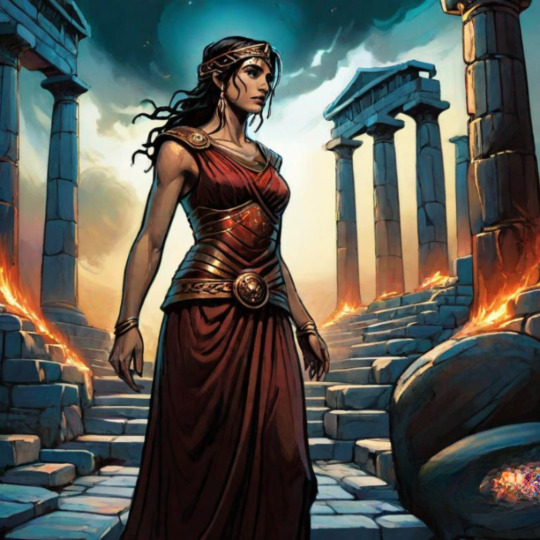
Cassandra, the ill-fated Oracle of Troy, was cursed by the god Apollo to know the future, but never be believed, driving her towards madness as she foresaw the doom of her city and family.
#cassandra of troy#oracle art#oracle#seer#the prophetess#trojan war#ancient troy#alteredai#ancient world#greek legend
5 notes
·
View notes
Text
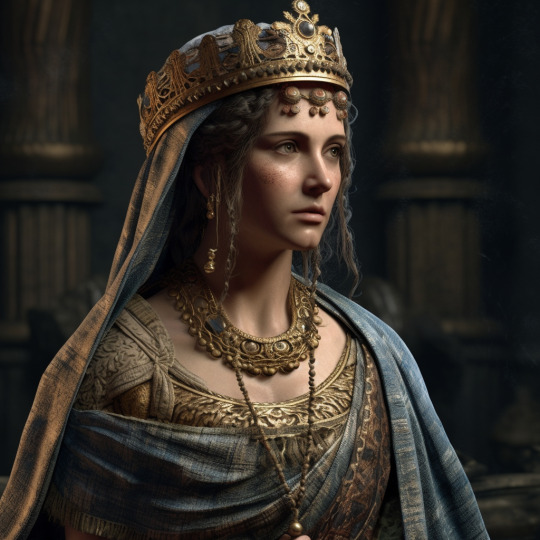

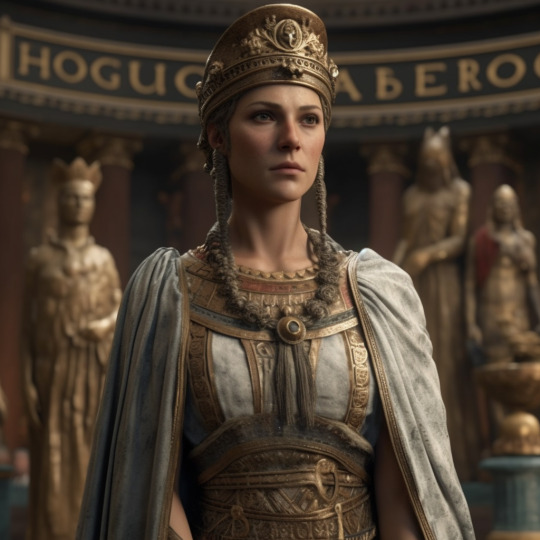
These are supposed to be renders of Hecuba, Queen of Troy, wife to King Priam and mother of Hector.
I feel like there's a lot more Hollywood in their costumes than anthropological evidence. The first one looks kinda ... medieval?
Also, the Latin script behind the last figure on the wall is wrong on two accounts. First of all, it's gibberish which Midjourney loves to do and it's in the Latin alphabet. Any writing would probably have been in some sort of cuneiform in Anatolia in the late bronze age. The Trojans were probably allies or vassals of the Hittites. Even the Mycenaean Greeks didn't use the alphabet of any sort yet. They were still using 'Linear B.'
by Midjourney v5
2 notes
·
View notes
Photo






Tiny Votive Pot Found in Ancient City of Troy
Archaeologists have discovered a tiny votive vessel in the ancient city of Troy that dates to the Hellenistic era. Just three centimeters (1.2 inches) high, it is the smallest container ever unearthed at Troy. It dates to the Hellenistic era, around 2,300 years ago.
The ancient city of Troy had already entered literary immortality centuries before this wee pot was made. The Illiad was written down around the 8th century B.C., but it was transmitting a far older oral tradition. The conflict that formed the kernel of truth inside the epic poem would have taken place in the 12th century B.C. during the Late Bronze Age collapse that felled civilizations all over the Mediterranean and Near East.
The earliest archaeological layers of Troy go back to 3500 B.C. when it was a small hilltop settlement. It evolved into a heavily fortified citadel that was regularly destroyed and regularly rebuilt and expanded, creating a stratigraphic crepe cake. Troy VIIa, destroyed in battle around 1180 B.C., is believed to be the Homeric Troy.
After yet another rebuild/destruction cycle, Troy was rebuilt by Greek immigrants around 700 B.C., reusing earlier walls. This iteration of the city, labelled Troy VIII, lasted until 85 B.C., throughout the Archaic, Classical and Hellenistic periods. By the Classical period (5th and 4th centuries B.C.), Troy had become a popular destination for tourism and pilgrimage, and by the 3rd century B.C., the city was largely transformed into a sacred site. Visitors would leave votive offerings to Troy’s mythic heroes and deities at the city’s temples. The tiny pot was one of them.
#Tiny Votive Pot Found in Ancient City of Troy#hellenistic era#archeology#archeolgst#ancient artifacts#history#history news#history world#ancient history#ancient culture#ancient civilizations#ancient troy
13 notes
·
View notes
Video
youtube
Unraveling the Secrets of Ancient Troy: Did Ancient Troy Really Exist?
0 notes
Text

The City of Troy from the Sea by François-Louis Schmied
#françois louis schmied#art#city#troy#sea#odyssey#the odyssey#homer#the iliad#iliad#europe#european#history#trojan#greek#greece#ancient greece#ancient greek#mediterranean#classical#antiquity#ancient#architecture
3K notes
·
View notes
Text
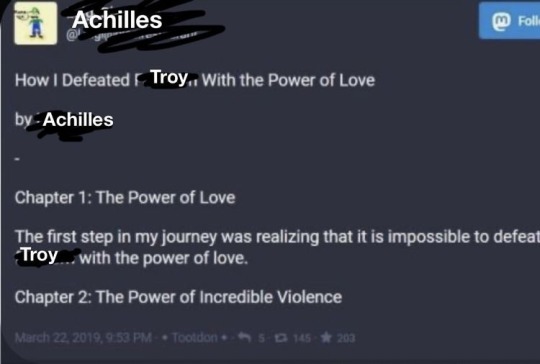
#it’s about time i actually post about tsoa#tsoa#the song of achilles#achilles#patroclus#patrochilles#ancient greek#greek gods#troy#song of achilles#ancient greek memes#incorrect greek mythology#incorrect greek gods#zen#ancient greek gods#ancient greek mythology#the odyssey#persephades#the iliad#homer#odysseus#lore olympus#userpelion
6K notes
·
View notes
Text
DEATH in the ILIAD: an Infographic

(originally 2014, updated slightly for 2023 - hey it's almost as old as Homer's Trojan War was long!)
#tagamemnon#iliad#homer#homeric#ancient li#greek myth#greek myth comix#greek mythology#achilles and patroclus#achilles#paris#troy#trojan war#infographic#death in the iliad#illustration#comix#statistics#information
2K notes
·
View notes
Text
I will never understand how Odysseus has all the braincells while also having none of them at the same exact time. He is an amazing war general and is insanely smart but has the attention span of a rat fuelled by the need to cause chaos simply because he is bored. He can't listen to one thing while getting distracted by the thing he was specifically told not to touch.
#this man will forever be an enigma#odysseus#the odyssey#homer's odyssey#the iliad#homer's iliad#ancient greek mythology#greek mythology#ancient greek#greek myth#greek mythology memes#greek myth memes#greek heroes#greek stuff#greek posts#greek blog#epic the musical#epic: the musical#epic the troy saga#epic: the troy saga#epic the cyclops saga#epic: the cyclops saga#epic the ocean saga#epic saga
2K notes
·
View notes
Text

Trojan Horse (2024)
498 notes
·
View notes
Text
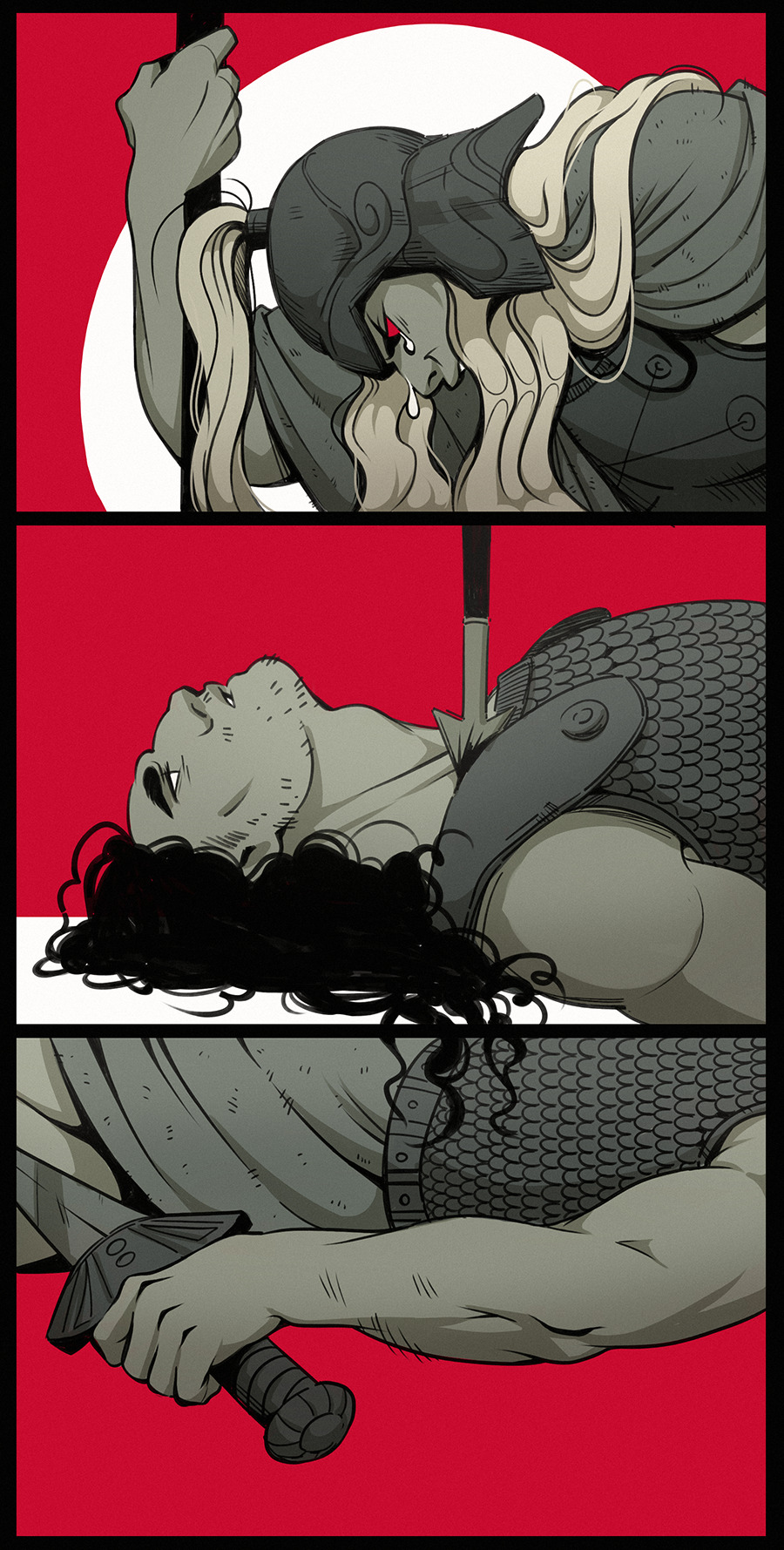
Hector's Death (version 1.2)
(aand you can now get it as a print or as a full-resolution .png on my patreon :D )
713 notes
·
View notes
Note
hiii. i need some help with an assignment but this is also just personal curiosity so i hope you don’t mind! we’re looking into helen of troy and i’ve notice (i shamelessly skimmed your tag on her) and you mentioned in one that she went with paris to have her voice heard? os smth like that? may i ask the summary of this version? or even some pointers on it? i’ve mostly (through google, i’m sorry) seen accounts of her story being either 1.) kidnapped by paris or 2.) seduced by him, which is the only one where she went willingly. I’m curious about this variation you mentioned! Thank you!
hi! i hope this answer comes in time for your assignment! i’m sorry for the slight delay, i had to rewrite this a few times for it to make sense. i hope this still helps.
(note that i’m gonna narrate this like canon i have hard proof for, which i don’t. i’m stating everything as facts cus i don’t wanna use “i think” or “i believe” everyone other sentence)
first of all, this idea of mine is not entirely original. it came to me when i was watching this video (starting 12:50) which is not entirely professional, but i did use other sources and retellings to build on the theory.
Helen’ characterization is very important to this theory of mine so here are a few words I would use to describe her: smart, independent, ambitious, politically cunning and quick-witted among other things. Honestly, I feel like Odysseus would be a good parallel for her. If you want to know more about my Helen characterization you can check out this and this. Importantly, Helen doesn’t like anything static — imo she enjoys the basic idea of change in itself.
Now a quick rundown of my thought process for those who might not be familiar with it. First of all, I think that Helen had a say in the initial decision of her marriage to Menelaus. If she wasn’t the the one who made the choice, then she manipulated her father into choosing Menelaus on her behalf. A marriage to Menelaus carries many benefits for Helen, among other things:
he’s rich
he has connections with Mycenae/Agamemnon without actually being Agamemnon
Helen knows him better than all the other suitors (since he grew up with her/was raised by her father)
he knows and loves Helen, he wouldn’t harm her
So, Helen and Menelaus’ marriage goes well for long enough that a daughter is born and has time to grow. But there are also some cons that Helen hadn’t considered when marrying Menelaus:
she’s now only “Menelaus’ wife”, not her own person
she has the added (unwanted) responsibility of being a mother
she married Menelaus out of convenience, didn’t love him at the time/didn’t recognize it as love
under Menelaus, women of Sparta lost many of their rights (compare to T:FoaC)
marriage means a static life
she doesn’t like being loved (i can’t explain this better than Florence, just listen to Girls Against God)
On top of that, Paris’ arrival gives Helen more incentive to run away:
Paris apparently loves her (compare to the last point above, i don’t think Paris *actually* loved her, but i think it was good enough for Helen)
the women of Troy had more freedom than women in Sparta at that point in Menelaus’ reign
she loses her responsibilities as a parent, hence gaining freedom (Paris doesn’t need an heir as much as Menelaus did since he’s neither king nor heir apparent)
Paris is young and hot
she thinks she can learn to love him with time (like she did with Menelaus)
Some other points to consider would be that a) she definitely didn’t expect Menelaus to start a war on her behalf, a fact that would’ve hindered her from going if she had known and b) Helen must’ve been under the extremest of protection following her kidnapping by Theseus, causing her to feel restricted. Considering that, running away would be a response to years of what seemed like captivity and also an act of protest.
Now, there’s no denying that basically everyone always speaks of the “rape” or the “kidnapping” of Helen, most importantly the Iliad does so itself, but I still think she ran away willingly. There’s an important distinction in who is talking about what specifically in the Iliad. Here is an excerpt from Helen’s perspective:
Ah! had I died, ere to these walls I fled // False to my country and my nuptial bed!
Yes, Menelaus (and others) speak of rape in other situations, such as in Book 8.
Already noble deeds ye have performed // A princess raped transcends a navy stormed
Helen though speaks of a choice. Obviously, Menelaus wasn’t there when Helen disappeared, but Helen was. She is more trustworthy in this situation. I don’t blame Menelaus for framing the situation as a kidnapping, because Helen had been kidnapped before which is cause for worry. Beyond that, even if Menelaus knew Helen had gone willingly, her “kidnapping” was merely an excuse for a war which Agamemnon had been anxiously waiting for. It was the perfect opportunity he couldn’t let pass. Another related argument for Helen having ran away (and that Menelaus knew) is the fact that Menelaus was close to killing her as punishment during the siege. In case of a kidnapping, she’d carry no fault and there’d be no reason to kill her, considering she’d be more of a victim than Menelaus himself (who undeniably suffered greatly).
As a quick side-note, I also think it’s important to consider Paris’ personality in this response. In my eyes, he’s simply not enough of a douchebag to kidnap or rape someone. Admittedly, I don’t consider the sex he had with Helen in Book 3 completely consensual, but I also don’t think he had any malintent whatsoever and, as said, he would never kidnap or rape anyone.
You also mentioned the seduction variation in your ask, which I am also not convinced by. Here are a few reasons why. First and foremost, I don’t consider Helen sentimental at all. She makes decisions based on what she knows, not based on what she feels, so love is no reason to leave the luxurious life she led. Some examples beyond her leaving with Paris are her ruthless murder of Deiphobus, which she did to regain Menelaus’ favour, or her imitation of Penelope’s voice beside the Trojan Horse, to make sure that there were in fact soldiers inside.
Beyond that, Paris simply doesn’t seem like the guy Helen would fall in love with. Ignoring the fact that I consider Helen to be on the aro spectrum, Paris, as a person, is somewhat of a downgrade from Menelaus. To back this up with some proof, her speech about Paris in Book 6 does not seem loving at all.
Heaven filled up all my ills, and I accurst // Bore all, an Paris of those ills the worst. // Helen at least a braver spouse might claim, // Warmed with some virtue, some regard of fame!
There are of course scenes where Helen seems like or even explicitly states she loves him, but Helen is canonically a good actress and acting in order to gain his and his family’s favour and thereby guaranteeing herself a place to live in luxury is nothing. Helen would do anything to survive, among other things, act.
Finally, there is Helen’s attempt at saving Paris’ life after he gets shot, which could be interpreted romantically. I simply do not consider it a romantic interaction. It could have been motivated by friendship or, in her case more likely, by guilt.
Again, I hope this comes in time for the submission date of your essay. If there’s anything I haven’t answered or you have follow-up questions, feel free to ask. I hope I can respond faster now that I have all this out of the way :)
#anon#asks#greek mythology#greek myth#helen of troy#helen of sparta#paris of troy#ancient greece#mythology#greek gods#mythos#trojan horse#trojan war#ancient troy#greek mythos#myth#ancient greek#ancient#iliad#homer#iliad of homer#menelaus#sparta#odysseus#agamemnon#troy#mycenae#judgement of paris
43 notes
·
View notes
Text
Here's something funny that I can't believe I've never shared before.
So I was scrolling through the Hector of Troy tag and I stumbled upon a post referring to him as the "son of Troy".
Now, in it of itself that's all fine and dandy, but it reminded me of something.
In Italian, the city of Troy is referred to as Troia.
The word Troia just so happens to be a mixture of the words bitch and slut.
So yeah, you just end up with these marvelous expressions:
"Hector, son of Troy" becomes "Ettore, figlio di Troia" = "Hector, son of a Bitch"
"Trojan War" becomes "Guerra di Troia" = "Slut War"
"Paris, prince of the city of Troy" becomes "Paride, principe della città di Troia" = "Paris, prince of the city of the Slut"
And I could go on.
Man, do I love my language.
#trojan war#the iliad#epic cycle#greek mythology#ancient greek mythology#hector of troy#paris of troy#tagamemnon
2K notes
·
View notes
Text
Agamemnon: I never considered you a rival.
Achilles: I never considered you at all.
#the iliad#incorrect greek heroes#achilles#greek heroes#achilles and patroclus#incorrect tsoa quotes#tsoa achilles#tsoa quotes#odysseus#tsoa patroclus#agamemnon#the odyssey#the song of achilles#greek myth art#greek gods#ancient greek mythology#ancient greece#ancient greek#troy#troy 2004
1K notes
·
View notes
Text
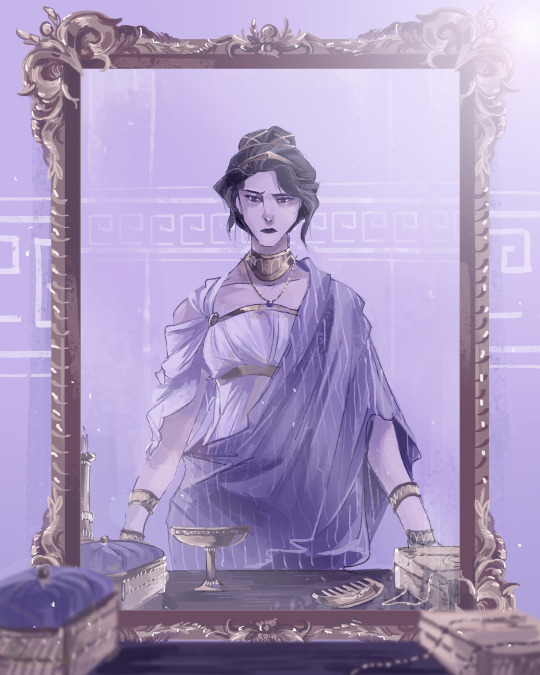
Waiting...
#i use her as an excuse to draw some nice ancient greece dresses#also she's pretty and i just like drawing her in general#penelope#penelope odyssey#odyssey#odysseus#epic the troy saga#epic the cyclops saga#epic troy saga#epic: the musical#epic the musical
3K notes
·
View notes
Text
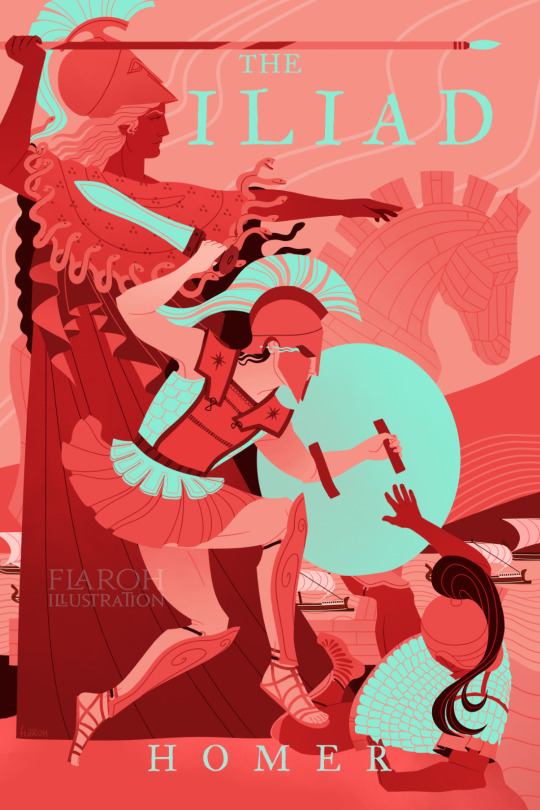
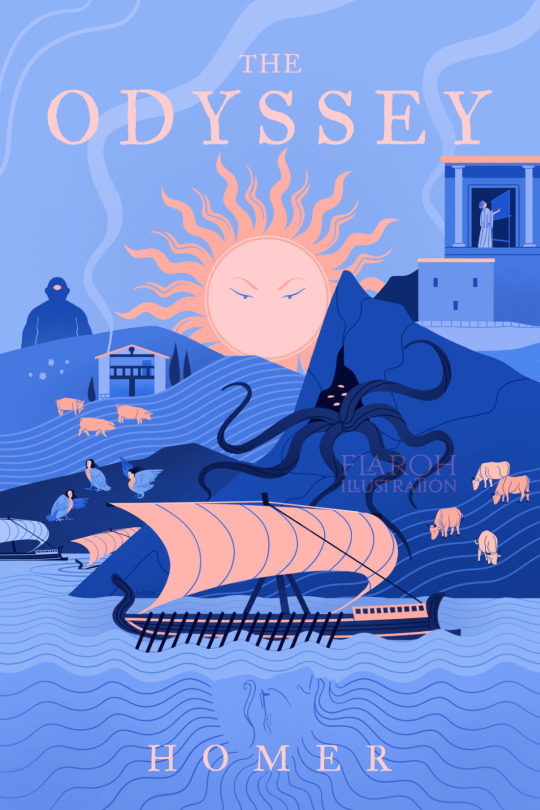
My mock book covers of the Iliad and the Odyssey ⚔🌊✨
☆Merch Here☆
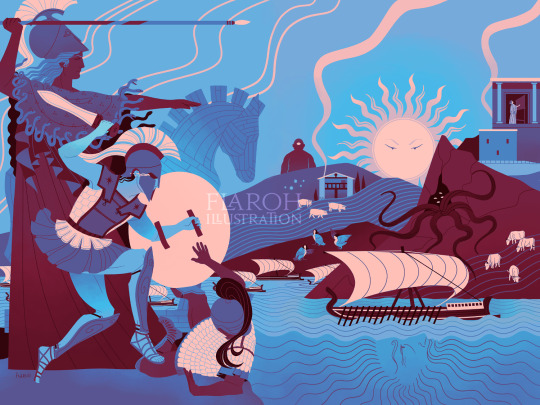
#the iliad#the odyssey#tagamemnon#ancient greece#greek myth#greek mythology#iliad#tsoa#odyssey#odysseus#achilles#classical studies#light acamedia#flaroh illustration#troy
4K notes
·
View notes